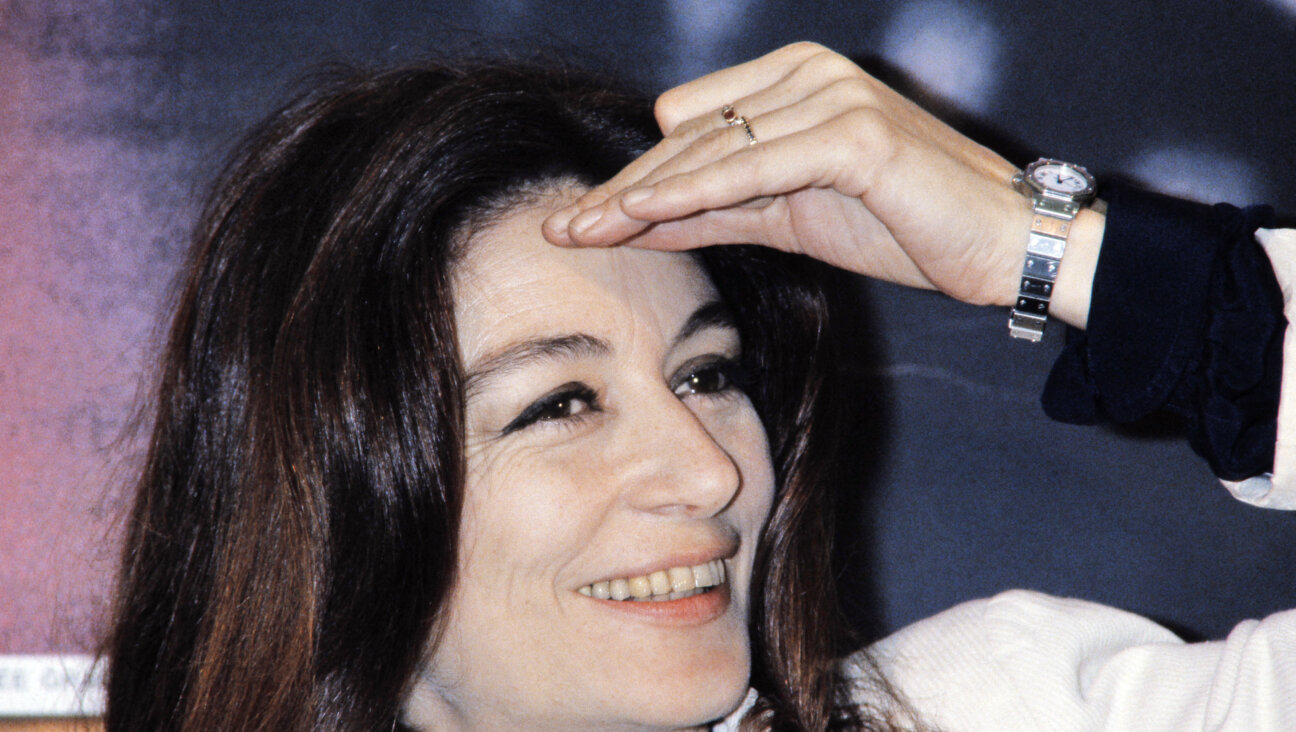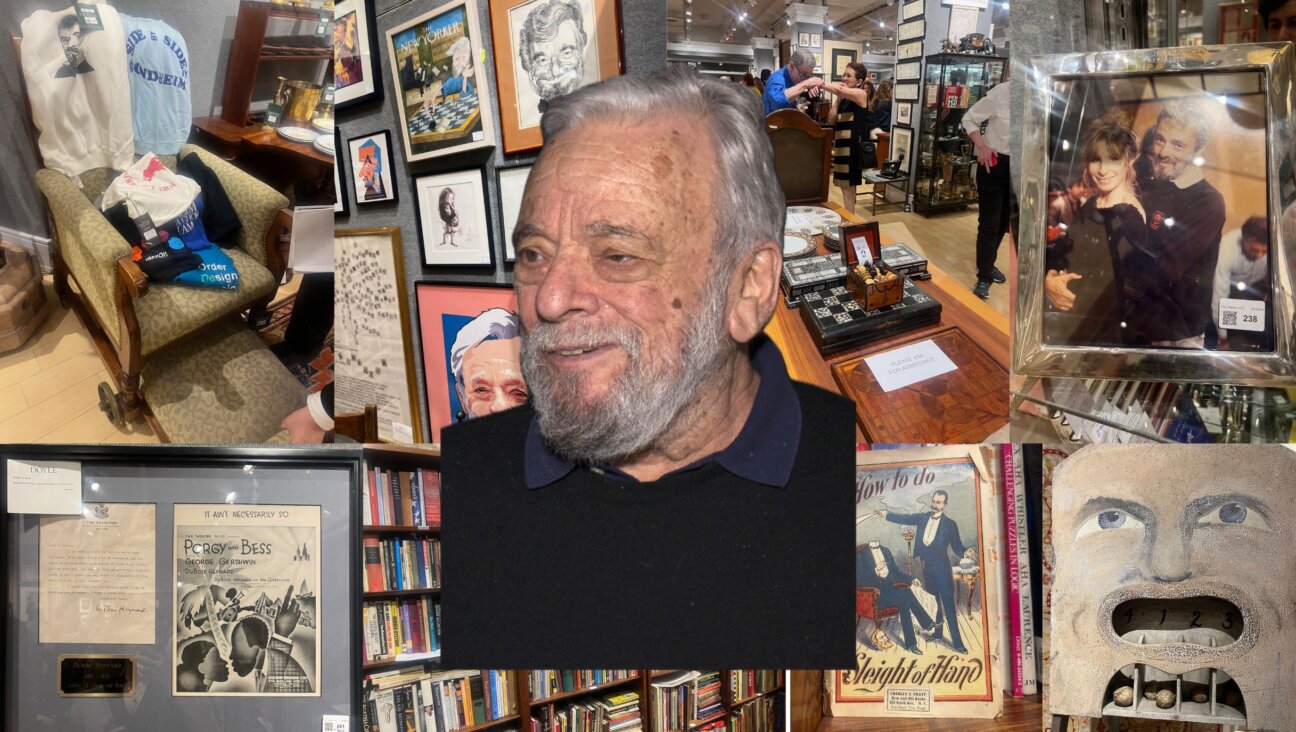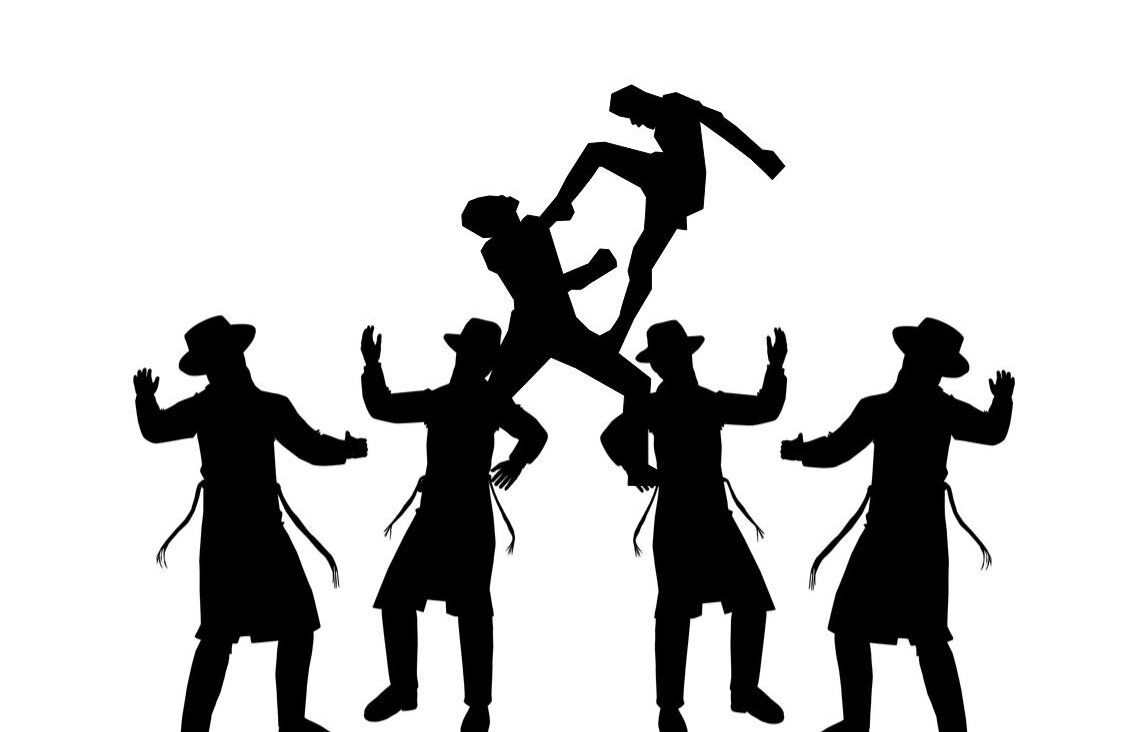The oral history of ‘Palestinian Chicken,’ Larry David’s favorite episode of ‘Curb Your Enthusiasm’
The most Jewish episode of ‘Curb’ — and one of its most beloved — retold by the people who made it
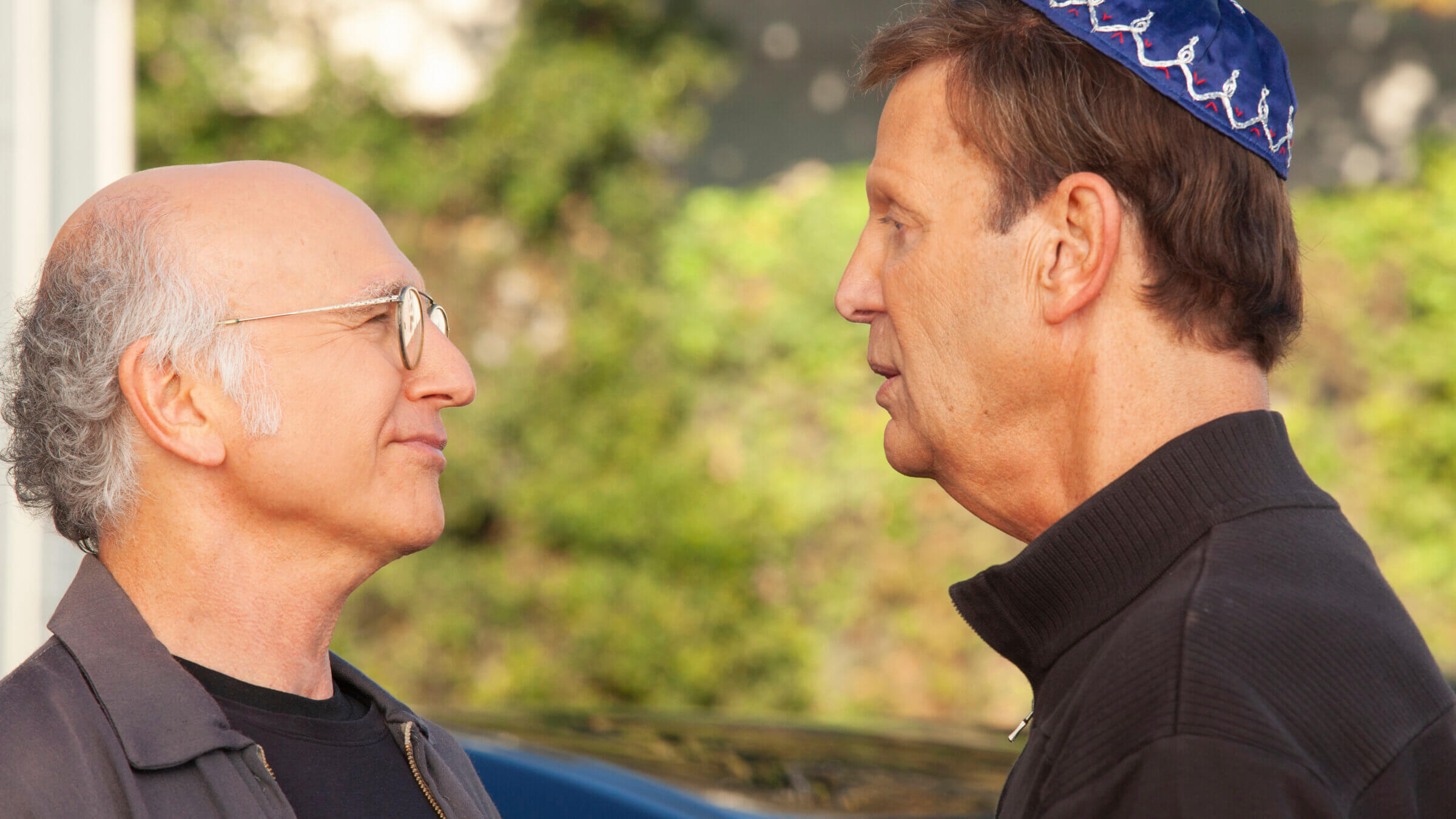
When Marty Funkhouser (right, played by Bob Einstein) tells Larry David he can’t compete in the big golf tournament because it’s on Shabbat, David says, “You’re Koufaxing us?” Courtesy of HBO
One of Curb Your Enthusiasm’s most beloved episodes had been rattling around its creators’ heads for a quarter century. And its story wasn’t even in the plot arc for the season in which it aired.
But “Palestinian Chicken,” the third episode of the Larry David comedy’s eighth season, seemed anything but dated when it aired on July 24, 2011, and today, you can’t assemble a list of the show’s greatest episodes without it. (It’s also L.D.’s favorite.)
The episode tells the story of Al-Abbas Original Best Chicken, a new restaurant that is earning rave reviews but has announced — to the outrage of Larry’s golf buddies — that its second location will be next to a Jewish deli. Larry, on the other hand, doesn’t mind the potential tension.
“You’re always attracted to someone who doesn’t want you,” Larry posits, looking at a poster on the wall that says “Right Makes Right.” “Here you have somebody who not only doesn’t want you — doesn’t even acknowledge your right to exist! Wants your destruction! That’s a turn-on.”
After a scene in the Al-Abbas parking lot in which Larry commands his friend Marty Funkhouser — who has become Shabbat-observant — to take off his yarmulke, he catches the eye of the restaurant’s proprietor, Shara. Larry uses the lure of the forbidden chicken to get Funkhouser’s rabbi to permit him to golf on Shabbat, paving the way for the group to win the tournament. Well, that’s the setup, anyway.
In not-quite-30 minutes of television, “Palestinian Chicken” gave us “Koufaxing” — a neologism that means bailing on something because of Shabbat — as well as one of the funniest sex scenes in the history of the medium. And, in a series with a penchant for memorable final shots, arguably its most iconic.
With the show’s 12th and final season premiering Sunday, members of the cast and crew behind the episode shared their memories of creating it. The interview has been edited for length and clarity.
‘A funny dilemma’
Jeff Schaffer (executive producer): This was the last episode we wrote that season. A lot of times when we’re writing a season, we’ll write nine shows that all sort of touch on the arc. So the slot that’s open is basically a freebie. That’s what this show was. There was a very funny idea about an antisemitic chicken place from former Seinfeld writer Steve Koren.
Steve Koren (longtime Seinfeld collaborator): Long story short, I used to go to this little Middle Eastern shawarma place. I forget what the real name of it is, but I went there forever. So one day I’m in there and I noticed they had put a little stack of newspapers out. I went, “Oh, what’s this?” They were written in Arabic, and slowly I’m reading, going, “I believe this is some kind of antisemitic, anti-Israel store here.” And I immediately went, “Oh my gosh, I’ve been going to a Palestinian chicken place!”
Then it suddenly hits you: Do I continue going here? Because they probably hate me. Or do I just leave it alone? I just went, “Oh, I have to file this away and do a story about it,” because it’s a funny dilemma. I pitched it for Seinfeld but the show ended before we got to it.
Schaffer: [Curb writers] Alec Berg, Dave Mandel and I, we really liked the idea. But a lot of times you say, “Well, this a good idea, but it’s really just a scene. It didn’t have a next level.”
Koren: I believe it was Dave Mandel who asked me to write something up. So I think I wrote up just a couple of beats — a beginning, middle and end. And then they certainly ran with it and took it a little further than I dared take it on my submission.
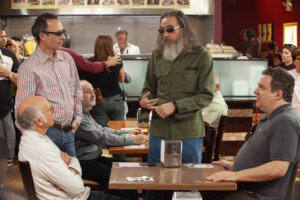
Schaffer: Larry had had something in his stand-up about how he’d have sex with an antisemite — and thus Shara was born. Once we were able to throw the sexy Palestinian woman into the stew, the show came together quickly.
Robert B. Weide (director): There’s quite a few Jewish storylines in the series, and I think it’s good to have a Jewish director for those episodes. So when I got that one, I was happy. But I have to say when I read the outline, it seemed as good as any other outline for the show. I mean, I thought it was funny, but it never occurred to me that it would become a really special episode.
I guess unavoidably it was political, but that was never the thinking. On Curb our criteria is simply what we thought was funny, without any underlying motive. There are certain things that you know are touching on something bigger or may offend some people. I mean, there’s that episode where Larry is taking a pee in the toilet and there’s backsplash that gets on some kitschy painting of Jesus. You know that’s going to upset some people, but f— it.
Schaffer: I would say, I know where the line is because I can look back and see it.
Making the cast
Anne Bedian (“Shara”): It was probably my first time doing an improv audition. The character description was “she’s Palestinian, she’s not politically correct, and there might be some nudity.” I said, “Great.” So I went for a pre-read with the casting director, and then I had a callback. And the callbacks were always done with Larry in the room.
Weide: People are sometimes shocked that they’re actually auditioning with Larry, because the conventional means of auditioning, you’re never with the star unless you’re on your third callback or something and they’re doing a chemistry read. But because Larry is in every scene, and every scene is really about how you deal with Larry, Larry would be there, and he’d do the scene.
Jason Kravits (“Ron”): It was the second time I auditioned for the show — the first time was for the chef at Larry’s restaurant. When I auditioned for that part, I started doing all these things, and Larry was like, “OK, hold on a second.” And I thought it was part of the scene. And he was like, “No, literally, hold on a second.” I’m like, “Oh,” and he goes, “You’re talking too much — it’s too much.” I didn’t get the part. Several seasons later, I get another audition and I thought to myself, “Don’t say as much. Just let Larry do the talking.”
Joanne Baron (“Rabbi Stein”): I was raised Jewish and I went to Hebrew school and then I went to school after Hebrew school until I was 16. And I played a rabbi opposite Dick Van Dyke on his show, I played a rabbi in Diagnosis Murder and I played a synagogue hostess in Crashing for Judd Apatow. So I was well versed.
I walked into the audition and I was improvising with Larry. We improvised different scenes related to the circumstance of me being rabbi. Something about him wanting to go play golf, getting Marty Funkel-whatever to play golf on Shabbos. I’m naturally very strong at improvising and Larry, of course, is brilliant. We’re both trained in the Meisner technique. So I knew how to be straight and be funny. Jeff Garlin, who was there, started laughing, and Larry started laughing and it seemed like they were having a good time and enjoying the audition. Someone — maybe Jeff — said, “You’re perfect, you’re a perfect rabbi,” something like that.
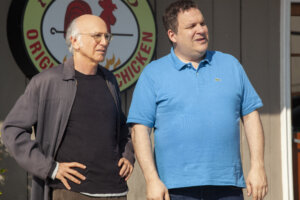
Bedian: My scene was: “You just saw Larry fight with his friend to take off his yarmulke, now he’s coming into your Palestinian Chicken restaurant, and at the end of whatever happens, he has to leave with your business card.” I think I said, “I like your face” — something like that.
Weide: Sometimes an actor comes in, and they’re just so perfect for it that they leave the room and we all look at each other like, “Well, that’s her.” I recall Anne being one of those people.
Schaffer: She came in and blew us away.
Steve Rasch (editor): She had the look, she’s sexy. You could see how Larry would do anything to get the girl. And the chicken.
Kravits: They brought me to the set, where they had me with Maggie Wheeler [who plays Kravits’ wife] getting set up with our microphones. That was the first time we met, and the first thing we were shooting was the dinner scene, where everybody was gonna be there. So Maggie and I were sitting there getting our microphones and talking about the scene. And Larry walked over. And we said, “Oh, hi Larry.” And he walked over and without saying a word, he just looked at us up and down at our costumes and he was like, “OK, that’s great.” And walked away. We just looked at each other like, “OK, well, I guess we passed that test.”
Weide: The one thing from “Palestinian Chicken” that was touching on something in the news at that time, there was talk about a mosque — it wasn’t even a mosque, it was a Muslim recreation center or something — that was going to be somewhere near Ground Zero. People were making a big fuss about that, like “how can they put this terrorist mosque in the middle of Ground Zero?” Of course, it was totally hyperbolized. The dinner table scene in the episode was meant to touch on that argument. You know, “How could they build the restaurant on the hallowed ground next to Greenblatt’s Deli? They should put it at least 2 miles away!”
Bedian: A lot of people are Jewish on the show. I wasn’t — I’m Armenian. But I actually studied Judaism for a long time — I learned how to read Hebrew so I could read the Zohar in Aramaic. So I know all the blessings — I’ve auditioned in Hebrew, and sound native almost. But I remember they were in another room discussing the next scene, which obviously I didn’t know what it was — now I know it’s the dinner scene, where Funkhouser, who has gone religious, wants to break bread. But none of them know the blessing. So they were standing there, thinking, “How do we find out.” I heard it and I said, “Baruch ata adonai eloheinu melech haolam hamotzi lechem min ha’aretz.” And they all just stopped and looked at me. They’re like, “You know it?” I’m like, “Of course I know it.” I’m like, am I in a room full of Jews? And nobody knows this blessing, but I know hamotzi? So I gave them the blessing.

In the episode, Funkhouser meets Larry and Jeff for lunch at Al-Abbas. After Larry tells him to take off his yarmulke — “This isn’t the raid on Entebbe” — Funkhouser storms off rather than go in without it. Onlookers inside the restaurant erupt into cheers, and Larry is greeted inside as a hero by Shara, who introduces herself; Larry gives his name as “Leib, son of Nat.” The next time we see the pair, they’re in bed, and Shara, on top of Larry, is telling him to “f— me like Israel f—ed my country.”
Schaffer: I’m standing right there next to the bed, feeding her lines.
Rasch: It might have been Weide, too.
Weide: Some of them were filthy, others were just funny. You know, “Occupy this, you Jewish f—.” “I’m going to do to you what Israel has done to my people,” you know, absurd things. Then she ran out of things to say. So we just started shouting things at her for her to imitate.
Schaffer: I think “I’m gonna f— the Jew out of you” was probably her.
Bedian: The nudity that they thought they might film was my back, and Larry refused. Actually I think he showed up in a sweatshirt and jogging pants and they convinced him to wear a T-shirt.
Weide: Even to get Larry to kiss Cheryl on the show is difficult because Larry’s just not comfortable with that stuff. And now in that scene we have him on his back having sex with this woman going to town on him. And I do remember Larry saying he wanted a pillow over his crotch so that they weren’t actually making any kind of contact, which I think is only fair.
Bedian: The sheets were actually taped to my underwear in the back so nothing would slip off accidentally — it was well coordinated and done very tastefully. But because of that, when we cut I couldn’t just jump off. So I was kind of stuck there. Between one of the takes, I remember telling him, “This is such a great show and great gig to get. But one of the things I feel bad about is, I’m not gonna be able to sit down and watch this with my dad.”
Funkhouser strolls into Larry’s house while he and Shara are having sex and overhears them, setting up a staredown between the yarmulke-wearing Jew and the Palestinian restaurateur.
Bedian: That scene where I walk down the stairs and I’m meeting Funkhouser — we all broke getting through that one. Except Funkhouser [the late, great Bob Einstein].
Schaffer: There’s some lines that we have prepared beforehand but that aren’t on the outline. And then there’s some things that Larry throws in that you don’t know where they came from — like him, after sex, sashaying down the stairs, doing “The Scarlet Pimpernel.” He had just watched that movie the night before.
Weide: I just directed Bob [Einstein], when he came in, to just look straight up into the camera, and that shot always cracks me up. We actually had [Shara] shouting at that moment live on the set so he had something to react to.
Rasch: Bob, he’s like an alien. He has this brilliant mind. He sort of takes everything and goes left. And the rest of the show has to catch up. That scene in Larry’s foyer when he comes down the stairs with Shara and they confront each other, with Bob’s reactions to them having sex upstairs, you know, that was all gold. He knew exactly what’s funny, and he gave it to you.
Weide: That line he says when he gets to the restaurant, “If Rabin can break bread with Arafat, then I can eat chicken at this Palestinian s—hole,” was totally Bobby. That was just such a good line. I’m sure he was thinking of it in the car as he was driving up. When that came out of his mouth, it was one of those times where I’d have to cover my mouth with my hand to not burst out laughing.
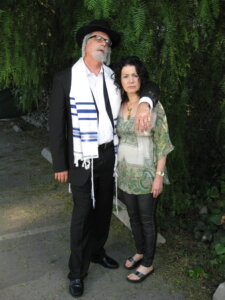
Kravits: He had this dry sense of humor, and he used it. At one point Bob came up to me and said, “Hey, you want to recur on this show?” And I said, “Yeah, of course. Why wouldn’t I?” He said, “I’ll tell you what to do. Wait till Larry’s talking to somebody else, and come up behind him and tap him really hard on the shoulder. When he turns around, just say, ‘Can’t wait to see what my character does next!’ He’ll love it.” That was his kind of like, jokey personality with me, like, you know, just trying to get me in trouble in stupid ways.
The golf tournament was the last thing we shot. By that time, I had gotten a little more relaxed and free to play, so like, throwing the golf club was my idea. And how I flipped out, yelling “L-O-L,” the script just said he flips out and runs off and Maggie goes chasing after me. I think they only needed one take of that, maybe two.
The episode concludes with dueling protests in the lot between Greenblatt’s Deli and the new Al-Abbas location. When Larry shows up, both groups try to persuade him to join their side.
Schaffer: We needed to find a restaurant that had a good parking lot that was going to be right in between another restaurant, and small enough that we could do the final shots. On Westwood Boulevard there’s a Lebanese restaurant called Sunnin that had the perfect parking lot — but the Greenblatt’s Deli, or whatever was next to it, was like a Mathnasium.
Weide: By the time I came back to direct this episode, it had been almost three years since I had directed the show. Originally it was about what corners we could cut — by season eight we had a bigger budget. We had an assistant director named Dale Stern; on the side of the building, it said something like “Westside Preschool, ages 3-5” — information about the school, kind of selling it. I said, “What about that? How do we turn that into a deli?” He said “Oh, we’ll just paint over the signage.” I just looked at him like, “We have the budget to do this now?” He said, “Oh yeah, that’s nothing.”
Schaffer: We wanted the restaurant to be as hostile to Larry and his kind as humanly possible. We wanted it to feel as “intifada” as possible. I mean the joke is, you love chicken made by people who hate you. Would you eat there? Why not do it to the utmost?
Bedian: Larry called me and Funkhouser together before the scene and he’s like, “OK, what are you gonna say?” And Funkhouser said, “You’re a Jew.” He’s like “OK, and what are you gonna offer?” I’m like, “I have a sister?” And he’s like, “Great!” That’s how it happens. I think he was the one who came up with her name — Yasmin.
Weide: I do remember coming up with things to put on the protesters’ signs. “The cluck stops here,” that was mine. I was coming up with these stupid puns. But I remember standing on set, and I’m standing next to this Hasidic Jew. And he’s just standing there, and I think once or twice why is this guy looking at me? And then I realize — “Oh my God, that’s Steve Rasch” — our editor.
Rasch: Usually I just inherit what they shot — they don’t want me on the set. And if I go to the set, they usually say, “What are you doing here?” But I popped in every now and then. I knew it was an interesting and important episode, and about one show a year I’ll ask, “Can you put me in something?”
So I got all into makeup, dressed up — and they didn’t cover me! They didn’t shoot me. In the madness of that, nobody shot me. And literally I combed the footage — believe me. Except in the wide shot you might see my head. It’s ridiculous.
Schaffer: Susie Essman’s husband, Jimmy, is also in there. He’s also pro-Greenblatt’s.
Weide: We didn’t own the street, meaning we couldn’t clear that stream of traffic. And I remember hearing later, I don’t know how this news came about, but I remember hearing a lot of people driving by and thinking it was an actual rally. Dale or someone else told me that a lot of people were walking by asking them what was going on because it looked very real.
‘Like a little piece of herring’
Bedian: After shooting, they gifted me the outfit I wore on the show — the red sweater and pencil skirt. And then that was pretty much it until it aired, like a year later. I don’t want to say I forgot about it. But it had been a year!
Weide: The editing on that show is a real bear. The process just went on and on, for months. Actors would finish for the season and ask me what I was going to do for the hiatus. I’m like, “What hiatus?”
Schaffer: The show keeps melting down to what it’s supposed to be. The first edit is long and bloated, because the editors try to give you more options. You kind of have to choose your own adventure. We would always have a little focus group — friends of ours that weren’t in the industry — to watch a cut.
Rasch: I do know that how we felt at the end of cutting was, “Oh, this is one of the good ones.” I knew it was my favorite. I submitted it for all the awards and so forth. I got an Emmy for that one.
Schaffer: The spectacular part of that season was going to New York — we had Rosie O’Donnell and the Hall of Fame, Michael J. Fox — I don’t think we thought people’s reactions would be, “Hey it was cool you went to New York, but this Palestinian Chicken is gonna be the one everyone remembers.” But I know we thought it was a really funny show.
Weide: When we started showing it to people, it became clear that it was a special episode. After that HBO screening in New York, Larry told me he never heard such screaming in the theater before. And then one of the people there was Regis Philbin. And then the next day, Regis on his show said that he had just watched one of the funniest half hours of television you’ve ever seen.
Baron: I did pretty soon understand that the response to it was that it was one of the best, one of the most memorable, one of the most indelible. And I have gone to see Larry in a Broadway show, and saw him backstage after and he greeted me very warmly. And I then got the idea that that episode was very meaningful, period.
Weide: Alan Dershowitz was friendly with Larry at the time — not so much in the last few years, but before Dershowitz seemingly became such a reactionary, pro-Trump guy. And I don’t know if he said this in jest, or if he really wanted to do it, but I think Dershowitz said at the time that he wanted to get a copy of the show to Netanyahu and to Abbas. He thought by watching it they could share a laugh over it and see how silly all this was. I was like, “Are you f—ing kidding me? You’re gonna start World War III!”
Bedian: About a month after it aired, I had an audition, and wore that sweater. And when I got out of the car at the audition, I was stopped by an elderly Jewish couple. They said, “I’m sorry, are you that character from that Larry David show?” I said, “Yes.” They said, “Uch, it was just fantastic! It was great seeing you!” It happens in person — even seven, eight years later I got recognized driving on the freeway.
Kravits: I get stopped regularly in New York City by people who go, “L-O-L!”
Schaffer: It’s stayed in the popular memory. It’s been lodged in there like a little piece of herring.
Rasch: The reason this one is so good, I think, is all the overlapping storylines come together perfectly at the end. Plus, Larry’s performance is great, plus the Palestinian and Jewish topic. That adds this very touchy and interesting overlay.
Schaffer: The stuff that we were parodying wasn’t as obviously horrific and incomprehensible as Oct. 7. Given the current horrific stuff, it’s almost poignant to look back on then. Right now things are so bad, I’m not even sure the most delicious chicken in the world could help. Put it this way: I wish all the problems in the world could be solved by amazing chicken.






